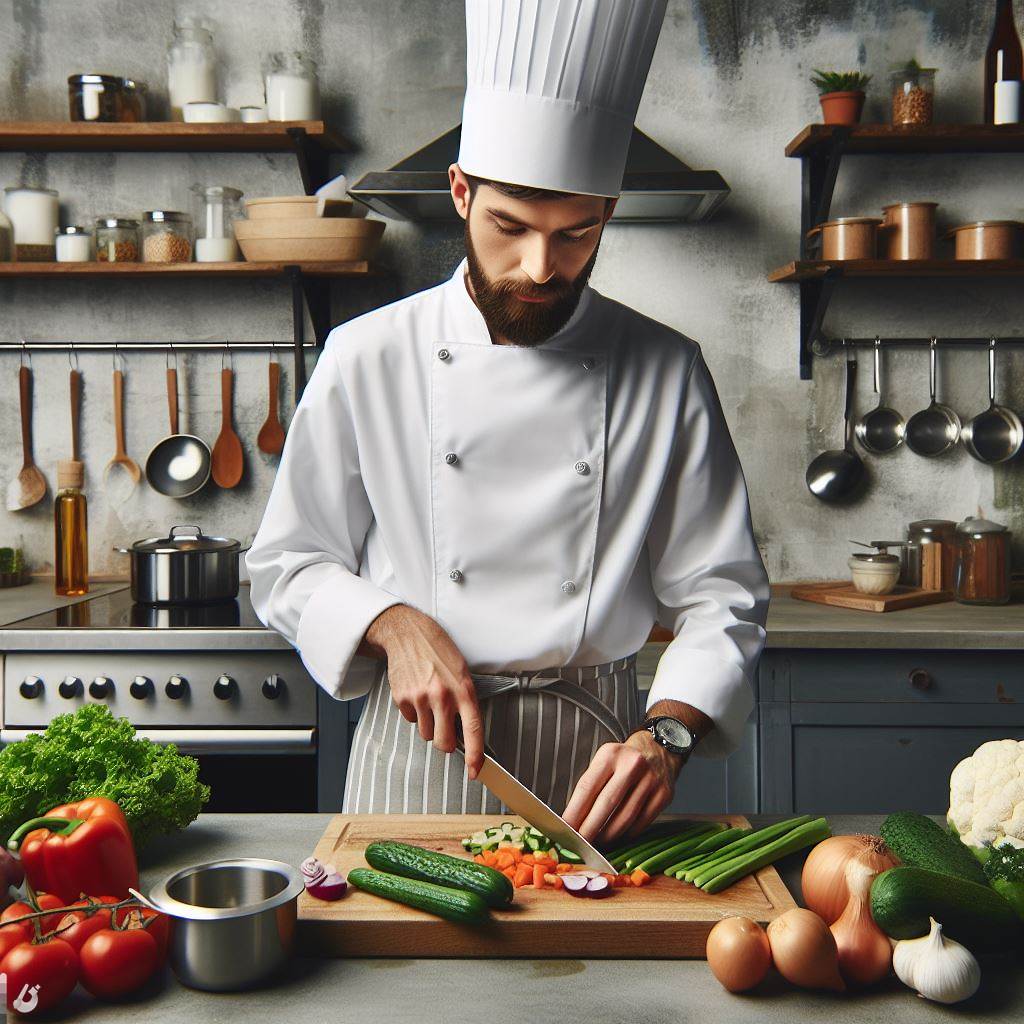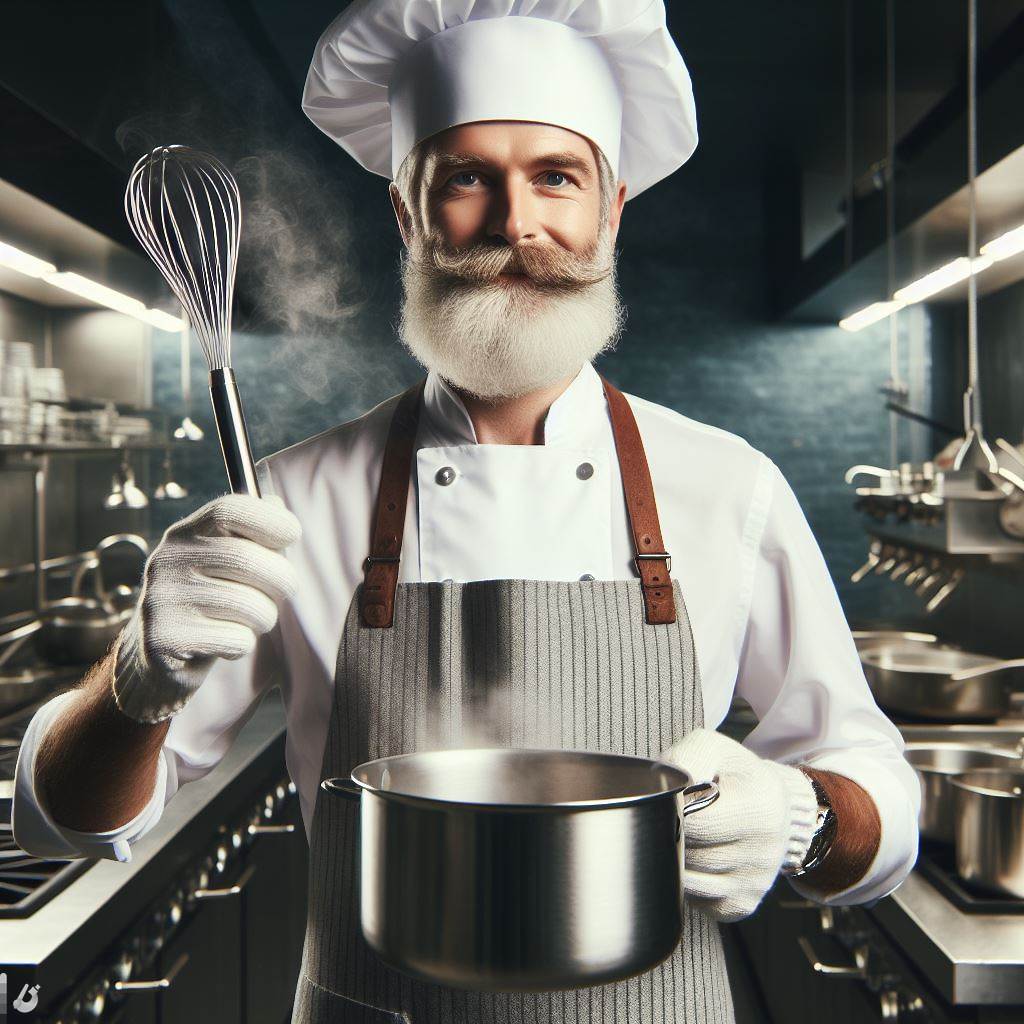Introduction
Brexit has had a significant impact on various professions in the UK.
Against the backdrop of political shifts and policy adjustments, UK chefs have found themselves at the forefront of adapting to a new era of culinary diplomacy.
The intricate web of trade agreements, import/export regulations, and fluctuating currency values has introduced a layer of complexity to the once seamless process of acquiring high-quality ingredients from
European markets. This, in turn, has prompted chefs to reassess their sourcing strategies, explore local alternatives, and embrace a renewed focus on seasonal, indigenous produce.
Furthermore, the exchange of culinary expertise and collaborative ventures between UK chefs and their European counterparts has encountered fresh challenges.
The ease of mobility for chefs to train and work across borders has been redefined, impacting the diversity of skills and influences within the UK culinary scene.
The dynamic cultural exchange that once characterized the industry now faces logistical hurdles, shaping a new narrative for chefs seeking to broaden their horizons.
In the midst of these challenges, a silver lining emerges as UK chefs embrace innovation and resourcefulness.
The drive to champion local flavors and support regional producers has given rise to a renaissance in British cuisine.
Chefs are now leveraging the rich tapestry of homegrown ingredients, rediscovering traditional recipes, and creating a distinct culinary identity that reflects the resilience and adaptability of the industry in the face of change.
This blog post will focus on the specific impact of Brexit on UK chefs and the food industry.
This exploration of the impact of Brexit on UK chefs and the food landscape unravels a story of adaptation, transformation, and the continuous quest for excellence in the ever-evolving world of gastronomy.
As chefs navigate this new terrain, the legacy of Brexit on the UK’s culinary identity is still unfolding, promising an intriguing journey of discovery for both chefs and gastronomes alike.
Overview of the UK Food Industry
Importance of Chefs in the UK Food Industry
- Chefs play a vital role in the UK food industry, showcasing culinary skills and creating unique dishes.
- Their creativity and expertise contribute to the diverse and vibrant gastronomic landscape of the country.
- By constantly innovating and pushing boundaries, chefs help establish the UK as a culinary destination.
- Their presence in restaurants, cafes, and hotels ensures a high standard of food quality and customer satisfaction.
- Additionally, chefs serve as ambassadors, promoting British cuisine and culture both domestically and internationally.
Role of the Food Industry in the UK Economy
- The UK food industry is a crucial sector, generating significant economic growth and employment opportunities.
- It encompasses farmers, producers, distributors, retailers, and hospitality establishments.
- In 2019, the food industry contributed £121 billion to the UK’s Gross Value Added, comprising 7.4% of the total.
- With over 450,000 businesses, it employs around 3.9 million people, making it one of the largest sectors.
- The food industry also supports other sectors such as agriculture, packaging, logistics, and tourism.
Reliance on EU Workers in the Food Industry
- The food industry heavily relies on EU workers, particularly in the hospitality and catering sectors.
- EU nationals have been a crucial source of talent, filling skilled and semi-skilled positions in kitchens.
- Their knowledge of diverse cuisines and culinary techniques has enriched the UK’s food culture
- However, Brexit has created uncertainties for EU workers, causing a decline in their numbers.
- Strict immigration policies and changes in labor mobility might lead to workforce shortages in the food industry.
In short, the UK food industry owes a great deal to chefs who bring their talent and creativity to the table.
Their contributions are not only artistic but also pivotal in driving economic growth and shaping the country’s culinary identity.
Personalized UK Career Consulting
Receive tailored career guidance designed just for you. Get actionable steps and expert support to boost your career in 1-3 days. Take control of your career now.
Get StartedYet, the industry is facing potential challenges due to Brexit. With the reliance on EU workers, there is a risk of labor shortages, impacting the sector’s ability to flourish.
The importance of nurturing and retaining homegrown talent becomes even more crucial.
The UK must continue to support its chefs and invest in culinary education to ensure the industry’s resilience and sustained success.
Read: MasterChef UK: Reality vs. Professional
Pre-Brexit Situation for UK Chefs & Food
Contribution of EU Chefs in the UK Culinary Scene
- EU chefs have played a significant role in shaping the UK culinary scene.
- They have brought their unique skills, techniques, and flavors to enrich British cuisine.
- EU chefs have introduced diverse ingredients and cooking styles, expanding the palate of UK consumers.
- Their creative approach has elevated the overall quality and innovation in the industry.
Ease of Movement and Employment Opportunities for EU Chefs in the UK
- EU chefs enjoyed the freedom of movement within the EU, allowing them to easily work in the UK.
- They could take advantage of job opportunities without the need for extensive paperwork or visas.
- This seamless mobility facilitated a dynamic exchange of culinary knowledge and experience.
- EU chefs brought their expertise to prestigious UK restaurants, enriching the dining experience for customers.
Positive Influence of EU Culinary Traditions on UK Cuisine
- EU culinary traditions have had a positive impact on UK cuisine, diversifying the culinary landscape.
- Britons now have access to a wide range of European dishes, ingredients, and cooking methods.
- EU culinary influence has fostered a more cosmopolitan food culture in the UK.
- It has encouraged the fusion of traditional British recipes with European flavors, leading to culinary innovation.
- The integration of EU culinary practices has contributed to the overall reputation and popularity of UK restaurants.
These factors combined have made the UK culinary scene vibrant, dynamic, and globally respected.
The presence of EU chefs not only brought their skills but also created a diverse and inclusive environment.
Customers enjoyed a multitude of options, and the exchange of knowledge took the industry to new heights.
However, as Brexit emerged, uncertainties began to loom over the future of UK chefs and food.
The next section will explore the changes that have been brought about post-Brexit and their impact on the UK culinary scene.
Stay tuned!
Read: UK Chef Trends: What’s Hot in 2024
Impact of Brexit on UK Chefs & Food
The changes in immigration policies and the potential impact on hiring EU chefs
Brexit has brought significant changes to immigration policies in the UK, and this has raised concerns about the future of hiring EU chefs.
Previously, EU citizens had the freedom to work and live in the UK, but with Brexit, new regulations have been introduced.
The potential impact on hiring EU chefs is worrisome. Many restaurants and culinary establishments in the UK heavily rely on the skills and expertise of EU chefs.
Your Dream Job Starts with a Perfect CV
Get a tailored CV and cover letter that captures your unique strengths and stands out in your industry. Let us help you make an unforgettable first impression.
Get StartedThese chefs bring diversity and new culinary experiences to the food scene.
The uncertainty surrounding the status of EU chefs currently working in the UK
Brexit has created uncertainty for EU chefs who are currently working in the UK.
Their status and rights to continue working in the country have become unclear.
This uncertainty has created anxiety and fear among these talented chefs.
Without a clear path to continued employment in the UK, many EU chefs might be compelled to leave.
This could lead to a significant loss of talented culinary professionals and disrupt the existing food landscape.
The potential loss of diversity and culinary expertise if EU chefs leave the UK
The potential loss of EU chefs would result in a decline in diversity and culinary expertise in the UK.
These chefs bring unique flavors, techniques, and skills from their home countries, enriching the culinary scene.
Their departure could lead to a homogenization of the cuisine offered in the UK, with a potential decrease in the variety of dishes available.
The loss of their expertise would be felt by both restaurants and food enthusiasts alike.
Moreover, the absence of EU chefs would have a negative impact on British chefs, who often learn and grow by working alongside chefs from different backgrounds.
The interactions and exchange of ideas foster creativity and innovation within the culinary industry.
In fact, Brexit has introduced changes in immigration policies that raise concerns about the future of UK chefs and the food industry.
The potential impact on hiring EU chefs, the uncertainty surrounding their status, and the potential loss of diversity and culinary expertise are all issues that need to be addressed.
Optimize Your LinkedIn for Success
Boost your LinkedIn profile with a professional bio, keyword-rich headline, and strategic recommendations that attract recruiters. Stand out from the crowd and get noticed.
Optimize NowThe UK government and relevant authorities should consider measures to ensure that the food industry continues to thrive.
This could include creating new immigration policies that attract talented chefs from around the world and providing support and reassurance to EU chefs currently working in the UK.
Moreover, by embracing diversity and welcoming culinary professionals from various backgrounds, the UK can maintain its reputation as a global hub for extraordinary food and ensure that Brexit doesn’t disrupt its thriving food scene.
Read: Health & Safety in UK Kitchens: A Guide

Economic Implications for the Food Industry
Decrease in Availability of Skilled Chefs in the UK
- Brexit could lead to a decline in the inflow of skilled chefs from the EU.
- With stricter immigration requirements, the UK may lose access to talented European chefs.
- The shortage of skilled chefs can impact the quality and diversity of the culinary scene.
- To compensate, the UK may need to invest in culinary education and training programs.
- Encouraging talented chefs from non-EU countries can also help fill the gap in skilled workforce.
Increase in Costs for Sourcing Ingredients from the EU post-Brexit
- The food industry heavily relies on EU countries for sourcing high-quality ingredients.
- Brexit can result in additional import tariffs and trade barriers, raising ingredient costs.
- The disruption in the supply chain may lead to delays and increased transportation expenses.
- Restaurants and food establishments may face difficulties in maintaining affordable prices.
- Exploring alternative sourcing options or promoting local produce can mitigate the impact.
Impact on the Restaurant Industry and Fine Dining Scene
- Brexit can impact the dining scene by causing uncertainty and changes in customer preferences.
- EU chefs and staff contribute to the diversity and uniqueness of the restaurant industry.
- A decrease in skilled workforce availability can lead to the closure of some restaurants.
- Fine dining establishments may struggle to maintain exceptional culinary experiences.
- Upscale restaurants may need to adapt by innovating menus or adjusting their business models.
In essence, Brexit’s economic implications for the food industry can be significant.
The potential decrease in skilled chefs can impact the quality and diversity of the culinary scene.
Higher ingredient costs due to EU sourcing challenges can affect pricing and profitability.
The restaurant industry, especially fine dining establishments, may face closures or the need for adaptation.
Moreover, it is crucial for stakeholders in the food industry to plan and strategize to minimize Brexit’s negative effects and explore opportunities for growth and innovation.
Read: The Evolution of British Cuisine by Chefs
Strategies and Solutions
Possible Solutions to Mitigate the Impact of Brexit on UK Chefs & Food
- Establishing trade agreements to ensure continued access to fresh ingredients and specialty products.
- Providing financial support, incentives, and grants to culinary businesses affected by Brexit.
- Encouraging collaboration and networking among chefs to foster creativity and exchange of ideas.
- Implementing marketing campaigns to promote British cuisine and attract tourists.
- Establishing partnerships with international culinary schools to facilitate knowledge transfer and cultural exchange.
- Enhancing visa processes to attract skilled chefs from around the world.
The Importance of Investing in Culinary Training Programs for UK Citizens
Investing in culinary training programs for UK citizens is essential to minimize the impact of Brexit on the industry.
These programs will:
- Equip individuals with the necessary skills and knowledge to meet the demands of the culinary sector.
- Promote innovation and creativity, allowing chefs to adapt to changing circumstances.
- Boost employment opportunities for UK citizens, reducing reliance on foreign workforce.
- Enhance the quality and reputation of British cuisine, attracting both locals and tourists.
- Facilitate the growth of local culinary businesses, contributing to the overall economy.
Promoting Local Produce and Fostering Sustainable Food Practices
To counter the challenges posed by Brexit, it is crucial to focus on promoting local produce and fostering sustainable food practices.
This can be achieved through:
- Establishing partnerships between farmers, producers, and chefs to ensure a steady supply of locally sourced ingredients.
- Supporting sustainable farming practices that minimize environmental impact and preserve natural resources.
- Encouraging consumers to buy local and support independent businesses, strengthening the local economy.
- Organizing food festivals and events that celebrate local cuisine and showcase regional specialties.
- Educating consumers about the benefits of sustainable food choices, creating a more conscious and responsible food culture.
- Implementing policies that incentivize sustainable practices and discourage excessive food waste.
Conclusion
To recap, Brexit has brought challenges such as uncertainty in labor supply and access to ingredients.
Brexit has reshaped UK chefs’ sourcing strategies, emphasizing local, seasonal ingredients.
Mobility challenges alter cultural exchanges, prompting culinary innovation.
Challenges include trade complexities and restricted mobility; opportunities arise in championing local flavors and fostering culinary resilience.
However, there are also opportunities for UK chefs to grow and showcase their culinary skills.
Moreover, it is important for readers to stay informed about the evolving situation and support the UK culinary industry.
Stay informed on Brexit’s evolving impact. Support the UK culinary scene by exploring local restaurants, embracing culinary diversity, and championing homegrown talent.
Together, let’s savor the dynamic flavors of change.
[E-Book for Sale]
500 Cutting-Edge Tech Startup Ideas for 2024 & 2025: Innovate, Create, Dominate
$19.99 • 500 Tech Startup Ideas • 62 pages
You will get inspired with 500 innovative tech startup ideas for 2024 and 2025, complete with concise descriptions to help you kickstart your entrepreneurial journey in AI, Blockchain, IoT, Fintech, and AR/VR.




